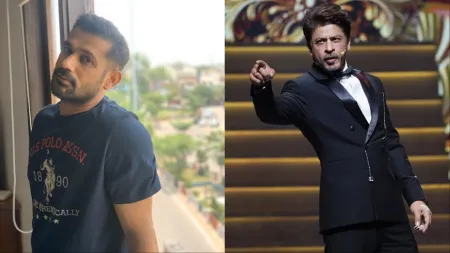In a world dominated by some frightful musical content racing to the top of the pyramid, there come these massive musical moments that become critical and compelling for history.
The release of Chain of Light (Real World Records) — four tracks by Ustad Nusrat Fateh Ali Khan in an album that was lost to the world for 34 years and released 27 years after the Pakistani qawwal passed away — will remain a gift to the world, and a massive credit to English musician Peter Gabriel who recognised the value of Nusrat’s brilliance in the ’80s.

Recorded in 1990 in Real World Studios in Box, a village in Cotswolds in the UK, amid “the right creative environment and the right food” as their label manager Amanda Jones told me once, the songs were released as Mustt Mustt (1990) and Night Song (1996), both extremely well-received albums world over. It was the surplus that went to Gabriel’s Real World Records’s storage facility, which was actually two World War II Nissin huts — steel structures once used as barracks for military troops.
Years passed and everyone just forgot about it. When these huts were to be demolished during Covid, the label employees began to go through everything and stumbled upon the “buried treasure”.
The album opens with that surreal combination of harmonium, tabla and conventional qawwali claps, the way most Nusrat pieces do. And then, without any fanfare, enters Nusrat’s pristine voice with Maangna bhi nahi mujhko aata, laaj rakha sawali ki daata, a Hindi qawwali. One can prominently hear his brother Farrukh’s chiselled and nephew Rahat’s still raw voices alongside.
As one immerses into the ecstatic piece, in a voice at the pinnacle of its sonic capabilities, there arrive these sparkling vocal stretches, and it’s here that the heart grows heavy. As Nusrat comes to life, one feels his early loss all over again. But the album is an expedient reminder of the visceral experience that his performances were. This is as close as we can get.
And as Nusrat searches for divinity, he becomes a sonic refuge by offering qawwali’s wisdom to us. He follows this with Punjabi Sufi scholar and poet Meher Ali Shah’s Ajj sik mitran di vadheri hai, Kyun dildi udaas ghaneri hai? (Why is the yearning for the loved one especially strong today? Why is my heart sadder today than even before?). Loosely based on raag Darbari Kanada, it reminds you of Nusrat’s expertise in singing his qawwalis with the dhrupad and khayal ang and not presenting them like folk music, thus allowing his music to be layered, complex and unique.
Ek silsila-e-noor hai har saans ka rishta (Every breath of mine is related to his chain of light), he sings in Ya Ghous ya Meeran, the qawwali from where the album’s title comes. But it’s Amir Khusrau’s Khabram raseed in raag Baageshri, a raga of yearning, the final piece, which leaves you with the ache of separation, stirring emotions that one didn’t know existed. The album, transcending all boundaries, is exactly what it should’ve been — a conduit between the past and present that can allow our antithetical world to look within if it chooses to listen, to understand how futile the war is, to find that spirituality within. It is the ceasefire the world needs to lend an ear to.
Chain of Light (Real World Records)
Composer: Nusrat Fateh Ali Khan
Vocals: Nusrat Fateh Ali Khan, Asad Ali, Rahat Fateh Ali Khan, Farrukh Fateh Ali Khan, Ghulam Farid, Khalid Mahmood, Majahid Mubarak Ali Khan, Rehmat Ali
Available on: Spotify and Bandcamp
Rating: 4 stars
Disclaimer: The copyright of this article belongs to the original author. Reposting this article is solely for the purpose of information dissemination and does not constitute any investment advice. If there is any infringement, please contact us immediately. We will make corrections or deletions as necessary. Thank you.







